| Srl | Item |
| 1 |
ID:
083038
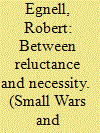

|
|
|
|
|
| Publication |
2008.
|
| Summary/Abstract |
The civil-military interface in peace support operations is changing due to increasingly overlapping tasks, increased military involvement in humanitarian activities, and increased integration of all involved actors, not least through various current strategic concepts. This article not only describes these trends, but also, more importantly, analyses certain consequences in terms of mission effectiveness. The focus of the analysis is the ideas of 'militarisation of humanitarian aid' and the reverse 'humanitarianisation of the military'. The main arguments of this contribution are that the assumptions of increased effectiveness stemming from civil-military integration cannot be taken for granted and that there are harmful consequences stemming from blurring the lines between civilian, humanitarian and military actors. There is, in other words, a need to better specify and explain the causal mechanisms that lead to effectiveness in complex peace support operations.
|
|
|
|
|
|
|
|
|
|
|
|
|
|
|
|
| 2 |
ID:
123897
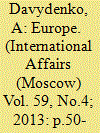

|
|
|
|
|
| Publication |
2013.
|
| Summary/Abstract |
THE INTERNATIONAL CONFERENCE entitled "The Role of Parliamentary Organizations in Building a Europe without Dividing Lines" was held in St. Petersburg by the Inter-Parliamentary Assembly of the CIS Member States and the Parliamentary Assembly of the Council of Europe (PACE).
|
|
|
|
|
|
|
|
|
|
|
|
|
|
|
|
| 3 |
ID:
154065
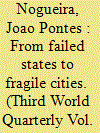

|
|
|
|
|
| Summary/Abstract |
It has become commonplace to claim that cities are becoming conflict zones, or ‘war zones’. This article traces some of the discursive and conceptual shifts that made it possible to define the city as a new frontier for international humanitarian action in states of the Global South. In order to represent cities as humanitarian spaces, concepts of ‘failure’ and ‘fragility’ have been problematised and subjected to reinterpretations that legitimised new strategies applied to the urban realm. I argue that this re-scaling of humanitarian practices enables a de-coupling and inclusion of so called new ‘urban conflicts’ in strategies of global liberal governance. Moving from failed states to fragile cites is a key development to understand changes in the practices that redefine humanitarian spaces today. The definition of urban violence as a new type of conflict informs a new cycle of expansion of the humanitarian order focused on the city. The article analyses the problematisation of concepts of failure and fragility as a decisive move to redefine the boundaries of humanitarian spaces.
|
|
|
|
|
|
|
|
|
|
|
|
|
|
|
|
| 4 |
ID:
143564
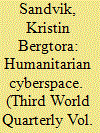

|
|
|
|
|
| Summary/Abstract |
In an effort to contribute to a more critical understanding of the role of information and communication technology (ICT) in humanitarian action, this article explores the topography of the ‘humanitarian cyberspace’ – a composite of ‘cyberspace’ and ‘humanitarian space’ – as it has emerged since the mid-1990s. The goals are to offer some observations about the conditions of the humanitarian cyberspace and to reflect on the relationship between the persistent features of humanitarian action and new developments brought on by ICT. The prism through which the role of ICT in humanitarian action is explored is that of the ‘shrinking humanitarian space’.
|
|
|
|
|
|
|
|
|
|
|
|
|
|
|
|
| 5 |
ID:
174729
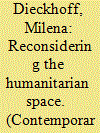

|
|
|
|
|
| Summary/Abstract |
Humanitarian agencies working in violent conflicts often insist on separating humanitarian negotiations from political mediation efforts. However, many academics and practitioners also wonder if humanitarian negotiations can really be apolitical and disentangled from peace negotiations. Using the case study of Syria, this article analyzes the interactions between humanitarian negotiations and international peace negotiations. By considering various actors involved in Syria and the different arenas of negotiations (mainly the Astana talks and the United Nations negotiations led by the Special Envoy), it demonstrates that humanitarian and peace negotiations are governed by a complex interdependence. A dual process of politicization of humanitarian action and “humanitarization” of political negotiations is at work, in a Syrian context characterized by a fragmented and controversial humanitarian space. This article is based on unique data from participant observation during four international meetings bringing together humanitarian practitioners from different organizations and political actors.
|
|
|
|
|
|
|
|
|
|
|
|
|
|
|
|
| 6 |
ID:
158667
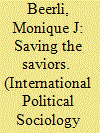

|
|
|
|
|
| Summary/Abstract |
Tracing transformations in the way that humanitarian organizations respond to insecurity in the field, this article examines the bureaucratization and professionalization of security in relation to intraorganizational struggles between humanitarian professionals. Whereas some advocate for the triumph of remoteness and bunkerization as organizing principles of humanitarian action, others challenge the imposition of security as a humanitarian logic of practice through acts of nonconformity. These tensions are illustrative of professional struggles over how to do and think humanitarian action. In articulating a sociological and transversal reading, this article points to the heterogeneity and divisions structuring the humanitarian space. To provide empirical insights into the bureaucratic work practices of headquarters professionals and the everyday practices of frontline humanitarian professionals, this article draws upon an analysis of humanitarian security manuals, interviews with humanitarian professionals, and field observations in Port-au-Prince. The article sheds light on the development of the humanitarian profession and on the novelty of the work practices of humanitarian security professionals, while contributing to debates on bunkerization and the literature on transnational professionals.
|
|
|
|
|
|
|
|
|
|
|
|
|
|
|
|
| 7 |
ID:
186624
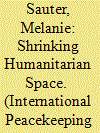

|
|
|
|
|
| Summary/Abstract |
While the peacekeeping mission in Mali is the deadliest active mission, aid workers are not a prominent target. This is puzzling because humanitarians argue that integrated missions aligning political, military and humanitarian goals impede their security. I argue that the fallacy of integrated peacekeeping missions is that the humanitarian space shrinks due to rising insecurity. This takes place when integrated missions blur the lines between civilian and military action and when they politicize humanitarian aid through biased mandates. I test the argument by comparing new data on peacekeeping stabilization projects with other aid projects, using a matched wake analysis that estimates a difference-in-difference model with sliding spatio-temporal windows. I find that peacekeeping stabilization activities increase violence against civilians on the ground in the short term, which ultimately decreases humanitarian access. Paradoxically, the UN names lack of humanitarian access as a key challenge to protecting civilians, but contributes to the access challenge itself.
|
|
|
|
|
|
|
|
|
|
|
|
|
|
|
|